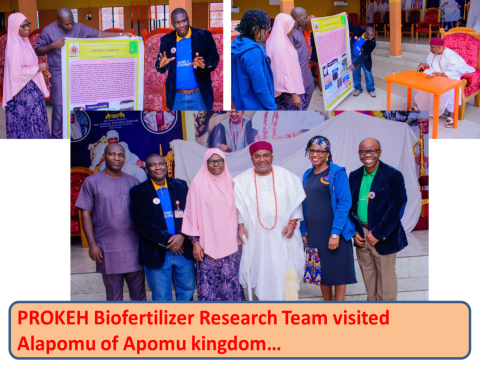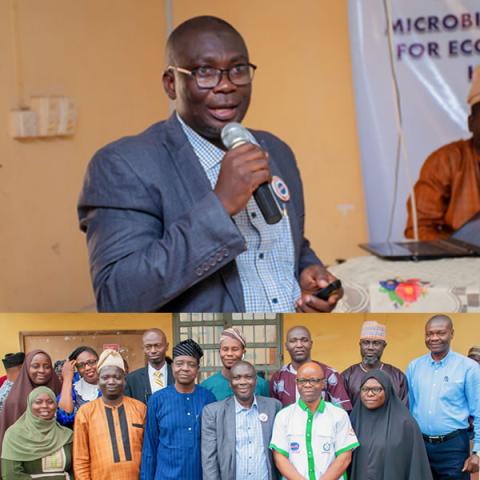About
The Research........
The PROKEH Research seeks to advance the biotechnological valorization of keratins to produce Protein-rich Keratin Hydrolysates (PROKEH) which can be employed as biofertilizers in growing plants. The research was conceptualized by a team of scholars led by Prof. Agbaje Lateef as the Principal Investigator in the Department of Pure and Applied Biology of the University. The research won a grant from Tertiary Education Trust Fund (TETFund) under its 2021 National Research Fund (TETF/ES/DR&D-CE/NRF2021/CC/EWC/00085/VOL.1.) with execution period of 24 months.
The research involves:
Ø Isolation and characterization of keratinolytic microorganisms that can degrade chicken feather and cow hoof
Ø Optimization of the keratin degradation and scale up of the bioprocess
Ø Analysis of the keratin hydrolysates and formulation of PROKEH as biofertilizers
Ø Formulation of nano-based PROKEH using calcium nanoparticles (PROKEH-CaNANO)
Ø Evaluation of the biofertilizers and nanobiofertilizers on growth promotion, phytochemical constituents, proximate composition and functional properties of some fruit and leafy vegetables in two ecological zones
Ø Study of impacts of the biofertilizers on physical, chemical and microbiological properties of soil
Ø Dissemination of the outcomes of the research and training of farmers on its use
Our previous studies
In our previous investigations, we reported the degradation of chicken feathers by:
Ø Aquamicrobium defluvii FH 20
Noteworthy that both B. safensis and A. defluvii were reported for the first time for their keratinolytic activities in our laboratory. Keratinases and keratin hydrolysates have been employed for different purposes at various times in our laboratory, such as:
Øsynthesis of silver nanoparticles
Ødehairing of hide and destaining of fabric
Øplant growth promotion in the laboratory and on the field using Amaranthus caudatus, Celosia argentea and Corchorus olitorius.
We have also advanced the use of nanoparticles in agriculture to enhance phytochemical constituents and antioxidant activities of:
Furthermore, nanoparticles have been used in our laboratories to:
Ø attenuate Cd and Pb toxicities in Moringa oleifera, and
Øimprove soil attributes, mineral absorption & photosynthesis in Moringa oleifera
Justification for the research and expected impacts
Through rearing of poultry and cattle, Nigeria generates hundreds of metric tonnes of feathers and hooves which contain keratins that are recalcitrant to biodegradation; thereby fuelling pollution of air, soil and water. However, these keratins are rich in proteins, which can be harnessed as sources of amino acids through eco-friendly valorization by keratinolytic microorganisms that are capable of innovative degradation of keratins. This brings about value-addition through bioconversion to valuable products. In our previous studies, we documented some potent local microbial strains that efficiently degraded keratins - hair, hoof, horn and feather.
Vegetables are important plant materials for consumption as they are rich in fibres, minerals and bioactive compounds that can fight diseases and promote health and well-being. The importance of fruits and vegetables is huge. The year 2021 was declared as the international year of fruits and vegetables (IYFV) by the UN to drive home issues about their production, processing and health benefits.
In the past, we demonstrated the postive impacts of keratin hydrolysates and silver nanoparticles on the growth, phytochemical constituents and functional properties of some leafy vegetables.
The aim of this research is to valorize poultry feather and cow hoof using microorganisms to produce protein-rich keratin hydrolysates (PROKEH) as biofertilizer and amino-acid supplements in agriculture.
This would reduce environmental challenges associated with current practices of disposing keratins and enhance the development of green processes in Nigeria. The study can contribute to the attainment of sustainable development goals 1 (No poverty), 2 (Zero hunger), 3 (Good health and well-being) 9 (industry, innovation and infrastructure) and 13 (Climate action) by:
Ø enhancing income of farmers through improved productivity of crops,
Ø practicing sustainable agriculture to fight hunger,
Ø promoting good health and well-being through production of enhanced phytonutrients by plants,
Ø developing local competence in innovative production of bio- and nanobiofertilizers,
Ø adopting eco-friendly treatment of keratins that forestalls burning practices


